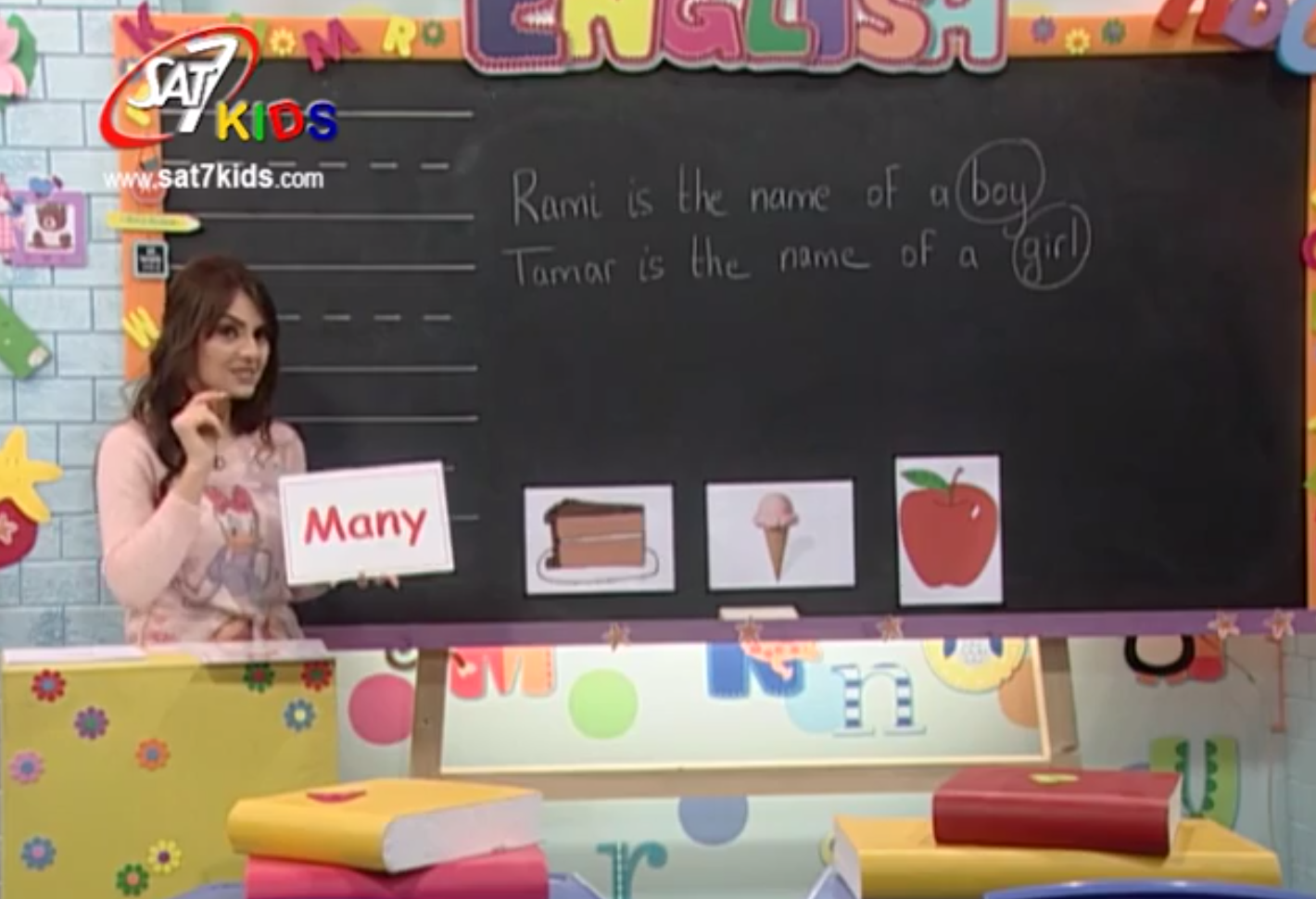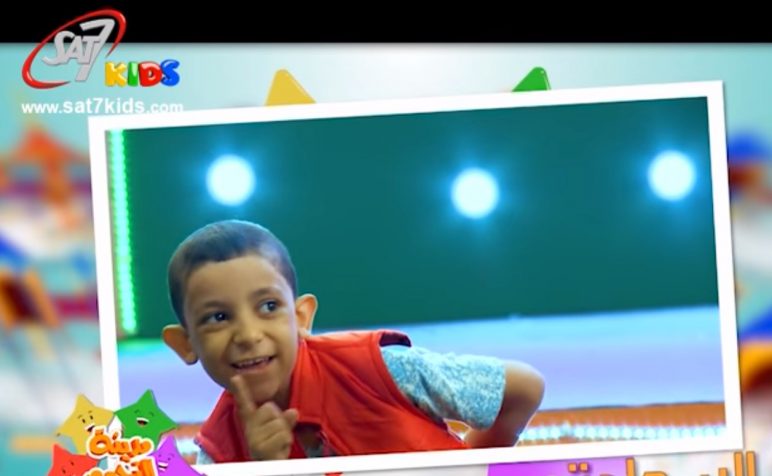Youtube screen capture of a SAT-7 ACADEMY programme, City of Stars
“Through satellite TV, we can reach out to 450 million people in this part (Middle East and North Africa) of the world, where most people have never met a Christian, seen a church or had a Bible in their own hands, but they can see the Gospel at home. They can watch our programmes in their language 24 hours a day — our production crew knows their problems and difficulties, and also their source of happiness.” —Kurt Johansen, executive director of SAT-7 Europe, Asia and Pacific
The conflict in Syria has already been 8 years. Although extremist group ISIS was reported driven out of the country, this multi-nations battle is yet to be ended. The Syrian government forces were still fighting with the rebels in May. Chronic warfare resulted in uncountable casualties and destruction. Millions of civilians lost their homes, and were either displaced within the country or have fled to countries in the Middle East and North Africa to seek asylum, such as Lebanon, Turkey, and Jordan. When their homelands were still devastated by conflicts, rebuilding their country seemed impossible. How do these refugees live in neighbouring countries? Why are their children and other Middle Eastern and North African children described as “the lost generation”? While facing multifaceted challenges, how does this younger generation bear hope for the future? Kurt Johansen, executive director of SAT-7 Europe, Asia and Pacific, a partner of CEDAR, answered our questions one by one.
More than an Humanitarian Crisis
According to SAT-7’s data, one-third of schools in Syria were damaged or used for military purpose. And more than a half of Syrian refugee children in neighbouring countries do not have a chance to go to school. They are vulnerable to being recruited as child labourers, or deceived to be child soldiers, or used as sex slaves. SAT-7 perceived that the Syrian Crisis had already been transited from a humanitarian crisis to a development issue. This involved development opportunity of children and youths, and is relevant to the long-term peace development in the area.
SAT-7 is a 24/7 Christian satellite television broadcaster for the Middle East and North Africa region, established over 20 years ago. SAT-7 saw the above development needs of children and youths, and hence, launched SAT-7 ACADEMY [1] in September 2017, providing educational programmes in various aspects, namely subject learning (Arabic, French, Mathematics, etc.), personal health, community development, social affairs, and spirituality. At present, residents in the Middle East and North Africa still mainly rely on satellite TV to receive information; for example, more than 78% of Syrian refugees living in informal tented settlements in Lebanon have access to satellite TV.

Johansen said, “They (refugee children) have no schools to go, but there is a ‘school’ on their TVs. I once visited a refugee camp in Lebanon, and I could not find one tent without a satellite dish. They can spend a whole day in front of the TV and therefore they can obtain schooling somewhat similar to school (through our educational programmes).”
SAT-7 believes that if children are not educated and did not learn values like inclusion and love, others will teach them opposite values, which can be seen from the prevailing propaganda on extremism in the Middle East and North Africa nowadays.
Against the Hatred Messages
“There are lots of needs for messages about peace, forgiveness, and love. Unfortunately, many local propaganda and media are spreading messages of hatred and revenge for honour. Thus, we believe that we do not only talk about hard facts (on our educational programmes), but also teach them how to live their lives, analyse issues, think critically and be an open-minded person.” Johansen continued, “Many young people do not have access to education, nor they have jobs opportunities and social welfare entitlement. They have no hope for the future. If ISIS promises to give them 50 US dollars a month to fight for them, they will probably go with them.”
Before the conflict cease, these children lost in neighbouring countries have their normal childhood seized. Dreams and development opportunities become empty talks. The United Nations describes them as “the lost generation”. Collaborative assistance from different sectors are desperately needed. Otherwise, they would easily be radicalised and become tools of extremists. SAT-7 understands this logic very well, and thus, they actively spread messages of love, forgiveness, care, and grace through their programmes.

SAT-7 produced a video clip a few years ago that went viral [2] and gained hundreds of thousands views. The video was about a 10-year-old Iraqi girl, Myriam, who chose to forgive ISIS, who made her and her family displaced from home. She prayed for God’s forgiveness on ISIS members that, “I will not kill them. Why should I kill them? I am just very sad. They drove us out from our home. Why did they do this?” She also said, “I will not do anything to them. I will only ask God to forgive them.”
Johansen said that when SAT-7’s team arrived Myriam’s refugee camp, they were there to film something else. But she came to them and said, “I have some feelings to tell you.” After listening to her, besides realising her watching SAT-7 programmes, they were astonished by her faith in God. “By the end of video shooting, we thanked her for teaching us many things. But she said, ‘I want to thank you for giving me a voice. I have nothing else to give.’ After that, we invited her to sing us a song. She sang about Christ’s salvation on her with her silvery voice. Myriam’s story was exactly the message we yearned to spread.”
“Thank you for giving me a voice”
Johansen said that a lot of TV broadcasters visited refugee camps, but they just made money from their productions without any help to the refugees’ situation. Therefore, guards of refugee camps would refused their entry. But, when the guards saw their SAT-7 badge, they welcomed the team. “This implied our credibility and their love for us. They have seen that we are here to improve their lives, but not to film something stupid or to make money out from them.”
SAT-7 upholds several principles in their TV production: genuine listening to interviewees, treating issues seriously, and looking for ways to improve. SAT-7’s programmes not only respond to refugee children’s learning needs, but also help parents understand more about their children’s situation. Johansen replied, “In some areas of Middle Eastern and North African countries, parents do not want to invest in their daughters’ education, but to hope their daughters to get married the soonest the possible, to avoid them from being raped. In view of this, we motivate the parents in our programmes that they should send their children to schools[j1] and understand the world.” Moreover, experiences of flight and persecution left a permanent mark in children’s hearts, of which the psychological trauma and stress were not fully understood by parents. SAT-7 explained about trauma in their programmes to teach parents how to understand their children. At the same time, they let children know how to express their inner feelings through drawing and singing to understand more about themselves.

According to SAT-7’s most recent survey, 5.8 million adults and 2.8 million children are watching SAT-7 ACADEMY programmes. More than half of the parents amid the audience agreed that the programmes could help their children. In the Middle East and North Africa, most audiences are from Muslim families. SAT-7 believes that the need of education is unbounded by religions. Believers from every religion all need to learn how to get along with others in peace and understand the world. “We want to teach them about Christ, but we also want to help them in their lives, like what Christ did on earth in the past,” Johansen said.
In the era of multimedia, SAT-7 endeavours to utilise the platform of social media to spread their messages. In addition to satellite TV, SAT-7 ACADEMY programmes will be played on YouTube and other platforms. Johansen hoped that Hong Kong Christians would pray for children in the Middle East and North Africa. Despite challenges everywhere for the next generation, there is still hope, just like Myriam.
“Through satellite TV, we can reach out to 450 million people in this part (Middle East and North Africa) of the world, where most people have never met a Christian, seen a church or had a Bible in their own hands, but they can see the Gospel at home. They can watch our programmes in their language 24 hours a day — our production crew knows their problems and difficulties, and also their source of happiness.” — Johansen
Let us pray for SAT-7 and local communities:
● May God protect SAT-7 teams and grant them love, creativity, and wisdom to listen to the refugees, produce more quality programmes, so that audiences are benefitted in knowledge, heart, and soul.
● May God’s grace lay upon SAT-7 ministry so that its social media platforms and TV programmes can have enough financial support to continue serving the people in the Middle East and Africa.
● May God watch over children and parents in refugee camps that they will be healed and able to keep learning amid adversity.
● May God work righteousness that leaders from countries intervening Syria’s conflict put local people’s welfare at top priority, instead of using them for self-benefit and leaving them ravaged by warfare.
● May love, peace, and justice come to the Middle East and North Africa region, and may the voice of the oppressed be heard by the world.
Support CEDAR’s Child and Youth Development work overseas with your prayers and donation. Click here for details.
[1] CEDAR Fund has been supporting partner SAT-7 to set up SAT-7 ACADEMY since 2017. We have written about the programme called City of Films before. The programme is produced by a group of Egyptian children and youth aged 8 years old or above. Read more
[2] Video link: http://www.youtube.com/watch?v=1wMONz2nZgg&t=317s





